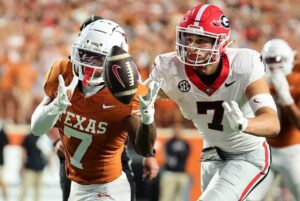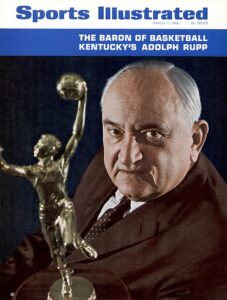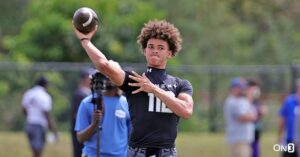Tyler Loop, welcome to Baltimore! In the sixth round of the NFL Draft, the Ravens choose the kicker from Arizona.
The Baltimore Ravens are no strangers to special teams excellence. From the long-standing dominance of future Hall of Famer Justin Tucker to the high standards set by special teams coordinator Chris Horton, the Ravens treat kicking like a fine art. And with the 218th pick in the sixth round of the 2025 NFL Draft, Baltimore made an eye-opening move: selecting Arizona Wildcats kicker Tyler Loop—a reliable, poised, and experienced leg from the Pac-12 ranks.
The move surprised some, given that the Ravens still have Justin Tucker under contract. But it also signaled Baltimore’s typical foresight, an organization always planning several steps ahead. Whether Loop is being brought in to challenge for kickoffs, serve as an eventual successor to Tucker, or bolster depth and competition, one thing is certain: the Ravens don’t draft specialists lightly. And Loop, with years of consistency at Arizona and a strong pre-draft process, earned his place.
Tyler Loop arrives in Baltimore with a reputation as one of the most accurate kickers in college football. During his four-year tenure at Arizona, Loop developed into a model of consistency. He converted 96.1% of his extra point attempts and 89.3% of his field goals over his collegiate career—numbers that put him near the top of all FBS kickers during that span.
Loop’s breakout season came in 2023 when he connected on 19 of 20 field goal attempts, including a perfect 5-for-5 from beyond 40 yards. He also went 45-for-45 on PATs, finishing the year as a semifinalist for the Lou Groza Award, college football’s most prestigious kicker honor.
Known for his smooth, repeatable mechanics and mental calm, Loop became a fixture of Arizona’s turnaround under head coach Jedd Fisch and later Brent Brennan. In close games, he was the Wildcats’ safety net—dependable in crunch time, immune to pressure, and always composed. That kind of steadiness is exactly what Baltimore values in its specialists.
Kickers typically aren’t drafted unless a team sees something special—or unless there’s a long-term strategy in motion. That’s what makes the Ravens’ selection of Loop particularly intriguing.
Baltimore has the NFL’s best kicker in Justin Tucker. At 35, he’s still performing at an elite level, but he’s also entering the twilight of his career. By selecting Loop now, the Ravens gain flexibility. They could develop Loop as a backup and kickoff specialist in the short term, perhaps even giving Tucker more rest in training camp. Long term, Loop could serve as the heir apparent, allowing Baltimore to continue its tradition of dominance in the kicking game.
This kind of forward-thinking move is vintage Ravens. General Manager Eric DeCosta has often used late-round picks to secure developmental players at key positions before the need becomes urgent. Just as Baltimore once drafted Sam Koch’s successor (Jordan Stout) while Koch was still active, they’re now setting up a similar transition at kicker.
DeCosta, after the pick, spoke to the media about Loop’s selection:
“Tyler’s been on our radar for a while. He’s calm, consistent, and has the mental makeup we look for in a Raven. We’re thrilled to add him to our locker room and special teams unit.”
Loop’s football journey began in Allen, Texas, a suburb of Dallas known for powerhouse high school football. Allen High School, which produced Kyler Murray, routinely churns out elite prospects—and Loop was no exception.
He committed to Arizona as a scholarship kicker, something few specialists earn straight out of high school. That alone is a testament to his leg strength and poise under pressure. Loop immediately made an impact at Arizona, handling kickoffs and eventually becoming the full-time placekicker by his sophomore season.
Through adversity, coaching changes, and team rebuilds, Loop remained one of the Wildcats’ most reliable performers. He never missed more than two field goals in a season, was rarely penalized, and routinely hit clutch kicks in tight Pac-12 games.
His background in high-stakes Texas football and four full seasons of starting experience in the Power Five make him uniquely NFL-ready. The Ravens didn’t just draft a leg—they drafted a competitor.
The Ravens’ special teams identity is deeply embedded in their franchise DNA. From head coach John Harbaugh’s own roots as a special teams coordinator to the perennial top-10 finishes in special teams DVOA, Baltimore builds from the kicking game out. It’s a core value.
Loop enters an environment where every special teams snap is treated with the seriousness of a third-down conversion. Under special teams coordinator Chris Horton, the Ravens demand near-perfection—and they typically get it. Justin Tucker’s remarkable career has been aided by elite long snappers and holders, and Loop will be expected to quickly integrate with that group.
Interestingly, the Ravens also drafted a long snapper last year, signaling their intent to keep that unit as airtight as possible.
In other words, this isn’t just a “camp body” pick. Loop is coming into a system that nurtures specialists and expects excellence from them every day. He’ll be given the tools, mentorship, and resources to elevate his game further.
While no one expects Tucker’s job to be in danger, Tyler Loop represents the start of a new chapter—however far away that may be. As Tucker ages, Baltimore now has a developmental prospect with upside and elite college production waiting in the wings.
Could the Ravens carry two kickers? It’s not impossible. They’ve done it before in preseason, and with new kickoff rules potentially reshaping how teams deploy specialists, Loop’s presence could prove strategically valuable. He has a strong enough leg to handle kickoff duties, which might allow Tucker to be preserved for long field goals and game-deciding moments.
Loop’s touchback percentage improved significantly over his final two seasons at Arizona, showing the kind of raw power that could translate to the NFL’s evolving rules around kickoffs and returns.
At the very least, Loop will be given a genuine shot to compete. He’s not just a placeholder—he’s insurance, upside, and a potential building block.
Following his selection, several of Loop’s former Arizona teammates posted congratulatory messages on social media.
Senior quarterback Noah Fifita wrote on Instagram:
“Baltimore just got a dog. Never seen a kicker with ice in his veins like Loop. He deserves this.”
Wide receiver Tetairoa McMillan posted on X:
“Loop was money all year. He never missed. Ravens got a real one.”
Those who know Loop best speak to not just his talent, but his demeanor. Coaches and teammates consistently describe him as calm, composed, and deeply committed to his craft.
It’s not easy to stand out as a kicker, but Loop did it the right way: through hard work, game-winning kicks, and quiet leadership.
Loop will now report to Owings Mills, Maryland, to begin rookie minicamp with the Ravens. He’ll work closely with special teams coaches, strength and conditioning staff, and veterans like Tucker, long snapper Nick Moore, and punter Jordan Stout.
The Ravens have already announced they plan to let Loop handle the bulk of kicking duties in preseason games, giving coaches a real look at how he performs in live NFL action.
He’ll have to prove he can handle the swirling winds of M&T Bank Stadium, deal with hostile AFC North environments, and adjust to the NFL’s narrower hash marks and faster pace. But if his college career is any indication, Loop is well-prepared for the challenge.
Drafting a kicker in the sixth round might not generate flashy headlines, but for Baltimore, it’s a chess move in a league filled with short-term decisions. Tyler Loop isn’t just another leg—he’s a long-term asset for a team that knows the value of stability in the third phase of the game.





